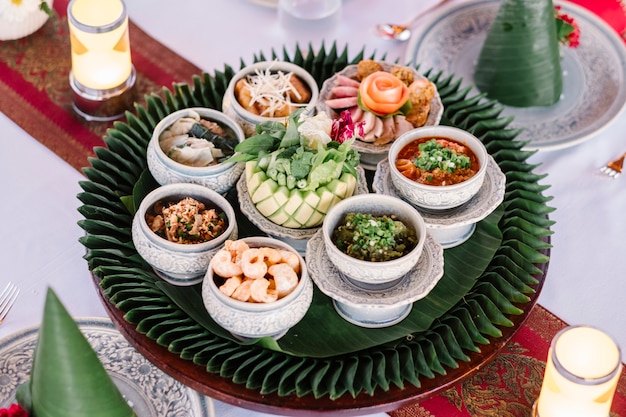In taking stock of our conducts in the past, we should not assume that the sole cause is only about eating. For example, if one gets cancer, it may not be only due to what we eat, but also about lifestyle choices.
There are certain ways in which we can perceive health care from a Buddhist perspective. For example, before eating, Thai Buddhist monks will deliberate the foods on the plate they are about to consume, which is connected with compassion, that is to say we consume everything, all living things, so that we should eat with mindfulness and gratitude.
The reason that monks do not talk to each other while they are eating is because they will be unable to deliberate such thoughts. In a secular context, people think the other way around. We talk at the dinner table because we think mealtime is the good timing for interaction. Meanwhile, mealtime for monks is when they contemplate on Dharma through the diets.
The simplest way we can do this is to look at the plate before eating, observing what the meal is comprised of. The monks in Buddha’s time would mix the savoury dishes with the sweets and ate them together to avoid the desire for the tastes.
We must remember that eating is to nourish and provide energy to our bodies, which is different from eating to enjoy the deliciousness. Food contemplations should be done together with practicing compassion – by disseminating it to the living things that ended up on our plate and show the appreciation to the foods we have.
In the spiritual way, what we eat are not the foods in the literal sense, but our patrons who we should be grateful towards. As such, people in the past called rice as Goddess Phosop, and called the river as Goddess Ganga. The meats consumed were considered as holy flesh and blood.
Therefore, eating like Buddhist monks is a sacred ritual which is different from having secular meals. While the monk’s eating culture is to eat and pray, in secular culture eating is to build up relationships. After all, their essences are one and the same, which is to eat for a healthy body.
If the inner journey is attached to death, how should we approach it? Or how can we come to terms with it?
Someone once asked Lord Buddha why humans do not journey inside their minds? They never look at their own minds even though it is so important. Lord Buddha said because humans do not think about the plainness in life, and they also excessively focus their minds on the path to success. He then asked ‘What are the common things in life?’ Lord Buddha replied him: ‘Birth, old age, sickness and death.’
Indeed, human’s life begins with death. If you always realize that one day you will die – this kind of awareness will lead you to have mercy, and to be unresentful. When you open your mind you’ll be accustomed to old age, sickness and death, unlike nowadays when people try to conceal these stories, and in turn causing death and sickness to be terrifying things.
In the viewpoint of Dharma practitioners, aging, sickness, and death are like gifts that complete the birth of the human being.
Therefore, sickness is a terrifying thing for the unprepared. Unlike those who are well-prepared and see this as a natural part of the life cycle. On the other hand, if you separate life and death, you would be living with the wrong idea from the beginning.
In the secular world, we do not realize how the mind functions. If we are afraid of anything then it will become more powerful. For example, if one is afraid of cancer, it is like one is calling for cancer. If you do not understand how the mind works, your body might suffer more. In other words, if we fear anything, we may unintentionally attract it to us.
For prayers, if someone has cancer but is aware of what death is, they will prepare their minds before they die, enabling them to feel that death is friendly, and as a result they will at least have better mental health. When ones let go of their minds they will know that death is not something to fear, and their minds will be free.
On the other hand, many people keep death out of their perception, so that their lives are upended. for example, for someone who does not eat to live but rather to enjoy the deliciousness, the four basic human necessities are not only about living anymore, but instead become a matter of personal taste or social dignity and status.
In summary, for this inner journey we have to think from the beginning that we are born for a certain period of time and that our lives are temporary. Lord Buddha once said, “When people realize what life is, Dharma will automatically flow into their minds.” If we understand the law of reason that one day we will eventually die, which are actually matters of emotion and instinct, we can contemplate death to learn how to prepare for death. After all, the inner journey is closely intertwined with the matter death.
Compiled by: Winna Rakkarn
Photo credits: Unsplash, Freepik
